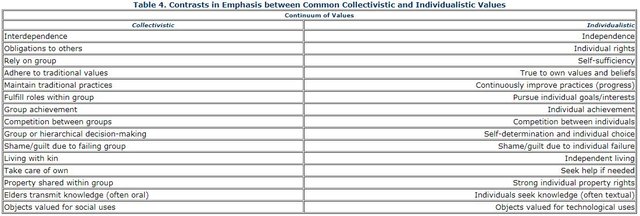
Are we group people, or do we go by ourselves? Another important element determined by culture is the values we carry regarding independent or interdependent behavior. We can conduct ourselves and our lives guided by our sense of group benefits, respect, consideration, honor, and reputation; or we live independent from any group only responding to our own goals, dreams, needs and purposes. This is what collectivism and individualism are all about.
As individuals, we behave according to the set of values, beliefs, assumptions and attitudes we have learned from our families, communities, and societies. These values respond and come from a cultural pool to which all individuals of a certain group have access hereditarily. Generation after generation, we teach and adopt these compases for life.
Now, there is a remarkable contrast between cultures that have collectivistic values and those with individualistic ones. Values regarding decision-making, knowledge transmission, concepts of progress, shame and guilt, expression of identity, and even property ownership vary from individual-oriented to collective-oriented cultures. Here's a table that provides contrast of different values associated with these types of cultures.
 source
sourceOn an educational context, a multi-cultural classroom can have all kind of students with different cultural values. It is important to understand that some of them will act different when facing group work as collectivistic students will seek the benefit of the whole group while individualistic students might only be interested in their own performance. This last group can also be more interested in learning and progressing as a self-fulfilling goal while the others might just settle with no standing out. Moreover, A teacher can be a great figure of authority and influence on collectivistic students while receiving a more peer-to-peer treatment from individualistic alumni.
A great key point derived from this knowledge is to promote understanding within this type of classrooms. It is a learning process to be set since day one till the end of the course. A teacher should do his or her homework and get to know students culturally, so this process forms part of the learning experience promoted in class.
@gaeljosser
TESOL 103 Class Assignment - BYUI